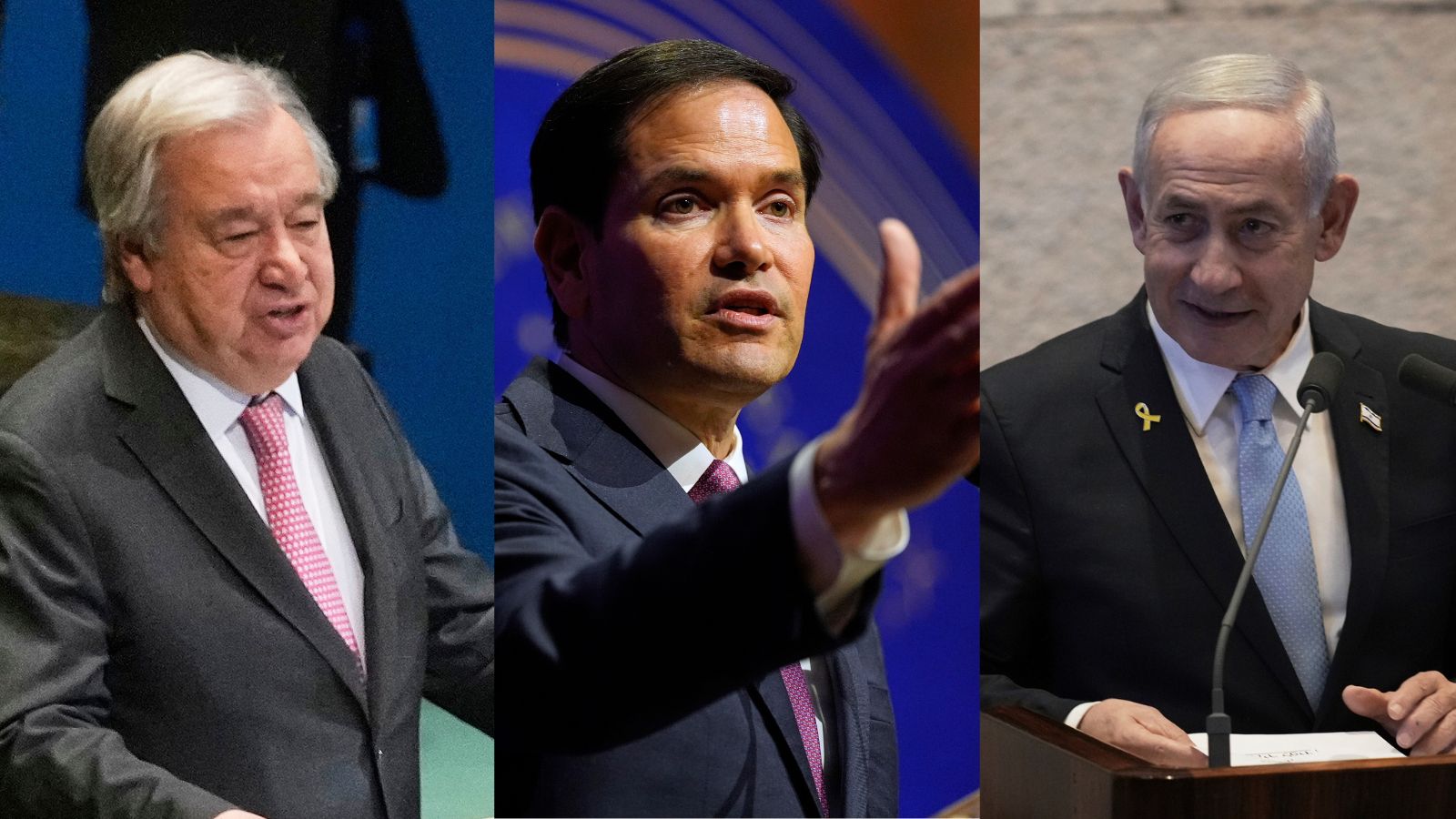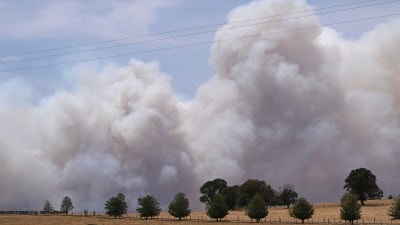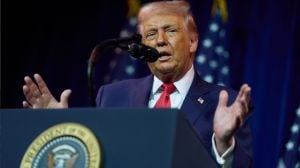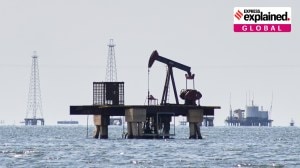Stay updated with the latest - Click here to follow us on Instagram
How the world reacted to Israel’s strikes on Iran’s nuclear facilities
Israeli Prime Minister Benjamin Netanyahu described the operation as a “decisive moment in Israel’s history,” vowing that the attacks would continue for days.
 The Islamic Republic’s Supreme Leader Ayatollah Khamenei warned of “severe punishment,” while Israel declared a state of emergency in anticipation of Iranian missile and drone retaliation. (Photos: UN Secretary-General António Guterres/AP, US Secretary of State Marco Rubio/AP, Israeli Prime Minister Benjamin Netanyahu/AP)
The Islamic Republic’s Supreme Leader Ayatollah Khamenei warned of “severe punishment,” while Israel declared a state of emergency in anticipation of Iranian missile and drone retaliation. (Photos: UN Secretary-General António Guterres/AP, US Secretary of State Marco Rubio/AP, Israeli Prime Minister Benjamin Netanyahu/AP)Israel launched a wave of military strikes on Iran early Friday, hitting nuclear and missile facilities as well as killing top military commanders and nuclear scientists, according to Iranian media and witness reports. Explosions were reported near the Natanz uranium enrichment facility and other strategic sites across Iran.
Israeli Prime Minister Benjamin Netanyahu described the operation as a “decisive moment in Israel’s history,” vowing that the attacks would continue for days. He said the strikes targeted “nuclear scientists and military infrastructure” to prevent Iran from further developing its nuclear program.
Iran, which maintains that its nuclear activity is for peaceful purposes, condemned the strikes and promised retaliation. The Islamic Republic’s Supreme Leader Ayatollah Khamenei warned of “severe punishment,” while Israel declared a state of emergency in anticipation of Iranian missile and drone retaliation.
Here’s how governments and leaders across the world responded:
- Benjamin Netanyahu, Israeli PM: “We are at a decisive moment in Israel’s history”
The Israeli Prime Minister said, “We are at a decisive moment in Israel’s history. Moments ago, Israel initiated Operation Rising Lion, a precise military campaign aimed at countering the Iranian threat to our very existence. This operation will persist for as long as necessary to eliminate this danger.” - Iran: “Zionist regime has committed a crime”
Ayatollah Ali Khamenei, Iran’s Supreme Leader, called the Israeli strikes a “crime” and vowed revenge. “The Zionist regime has committed a crime in our dear country today at dawn with its satanic, bloodstained hands… With this crime, the Zionist regime has prepared for itself a bitter, painful fate,” Khamenei said, as reported by Iranian state media. - India: “Utilise diplomacy”
India, maintaining ties with both Iran and Israel, called for de-escalation: “Existing channels of dialogue and diplomacy should be utilised to resolve underlying issues,” said the Ministry of External Affairs in a statement. India added that it was closely monitoring developments and issued advisories through its embassies in both countries, urging citizens to avoid non-essential travel and stay safe. - United States: “We are not involved”
US Secretary of State Marco Rubio clarified Washington’s position: “Tonight, Israel took unilateral action against Iran. We are not involved in strikes against Iran and our top priority is protecting American forces in the region… Let me be clear: Iran should not target US interests or personnel.” - Pakistan: “Unjustified aggression”
According to PTI, Pakistan’s Foreign Office said: “Pakistan strongly condemns unjustified and illegitimate aggression by Israel… Iran has the right to self-defence under Article 51 of the UN Charter.” Islamabad further stated that the strikes violated Iran’s sovereignty and urged the international community to act decisively to stop further escalation. - China: “Avoid further escalation”
Lin Jian, Chinese Foreign Ministry Spokesperson said, “China opposes the violation of Iran’s sovereignty, security and territorial integrity, opposes the intensification of contradictions, the expansion of conflicts, and the sudden rise in temperature of the regional situation.” He added, “China calls on all parties concerned to do more things that promote regional peace and stability and avoid further escalation of the tense situation. China is willing to play a constructive role in easing the situation.” - UN: “Show maximum restraint”
Spokesperson for UN Secretary-General António Guterres said: “The Secretary-General condemns any military escalation in the Middle East… He is particularly concerned by Israeli attacks on nuclear installations in Iran while talks between Iran and the United States on the status of Iran’s nuclear programme are underway.” He added, “The Secretary-General asks both sides to show maximum restraint, avoiding at all costs a descent into deeper conflict, a situation that the region can hardly afford.” - United Kingdom: “Escalation serves no one”
UK Prime Minister Keir Starmer urged restraint: “Escalation serves no one in the region. Stability in the Middle East must be the priority and we are engaging partners to de-escalate. Now is the time for restraint, calm and a return to diplomacy.” - Australia: “Alarming escalation”
Australian Foreign Minister Penny Wong said: “This risks further destabilising a region that is already volatile. We call on all parties to refrain from actions and rhetoric that will further exacerbate tensions.” He added, “We all understand the threat of Iran’s nuclear and ballistic missile program represents a threat to international peace and security, and we urge the parties to prioritize dialogue and diplomacy.” - Japan: “Deeply regrettable”
Foreign Minister Takeshi Iwaya condemned the use of force: “Amid ongoing diplomatic efforts, including talks between the United States and Iran, to achieve a peaceful resolution of the Iranian nuclear issue, the use of military force is deeply regrettable.” He added, “The government strongly condemns this action, which escalates the situation.”
- New Zealand: “Unwelcome development”
Prime Minister Christopher Luxon stated: “It’s a really unwelcome development in the Middle East. The risk of miscalculation is high. That region does not need any more military action, and risk associated with that.”
- Oman: “Dangerous, reckless escalation”
The Sultanate of Oman, which has been mediating US-Iran nuclear talks, called the Israeli strikes “a flagrant violation of the UN Charter”. It added, “Oman holds Israel responsible for this escalation and its consequences, and calls upon the international community to adopt a firm and unequivocal stance to halt this dangerous course of action.”
- Saudi Arabia: “Clear violation”
Saudi Arabia denounced Israel’s actions, calling them: “Blatant Israeli aggressions against the brotherly Islamic Republic of Iran, which undermine its sovereignty and security and constitute a clear violation of international laws and norms.” - Indonesia: “Exacerbates tensions”
Indonesia’s Foreign Ministry strongly condemned the attack, warning: “The attack risks exacerbating existing regional tensions and could potentially trigger a broader conflict. All parties must exercise the utmost restraint and avoid any actions that might escalate tensions or cause further instability.”
(With inputs from Reuters, PTI)
- 01
- 02
- 03
- 04
- 05































